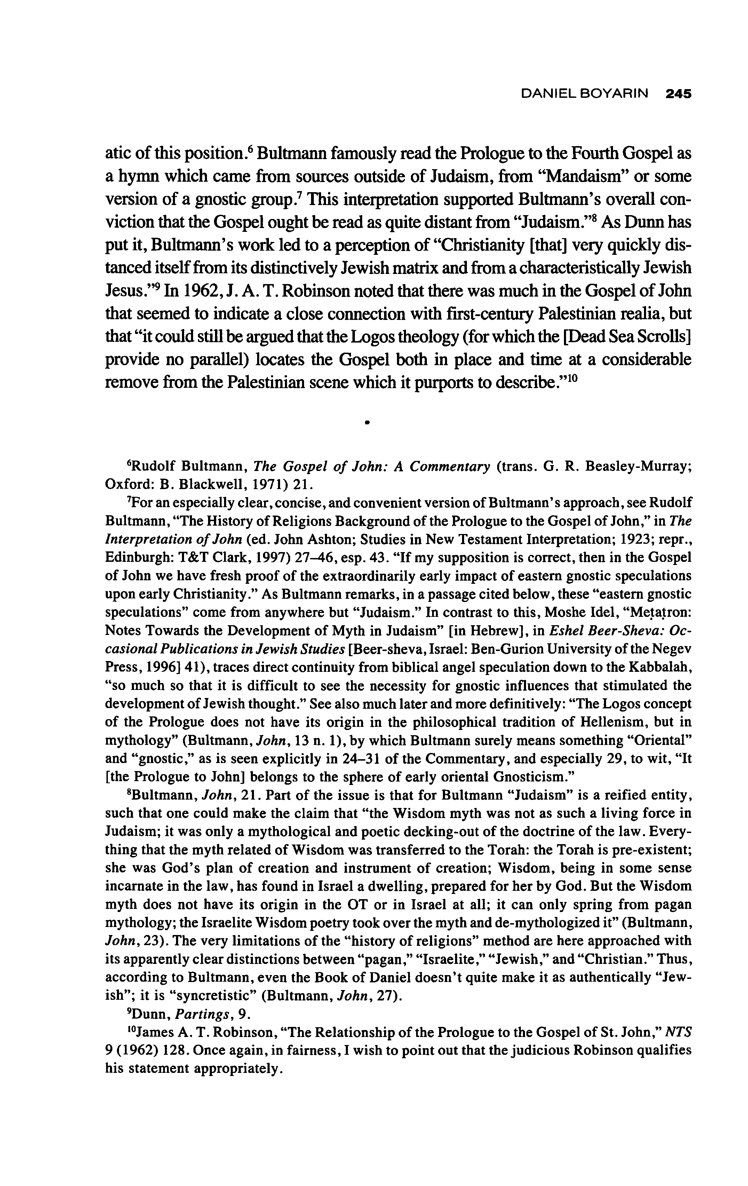ture dramatically.

D A N I E L B O Y A R Í N 2 4 5
atic of this position.6 Bultmann famously read the Prologue to the Fourth Gospel as
a hymn which came from sources outside of Judaism, from "Mandaism" or some
version of a gnostic group.7 This interpretation supported Bultmann's overall con-
viction that the Gospel ought be read as quite distant from "Judaism."8 As Dunn has
put it, Bultmann's work led to a perception of "Christianity [that] very quickly dis-
tanced itself from its distinctively Jewish matrix and from a characteristically Jewish
Jesus."9 In 1962, J. A. T. Robinson noted that there was much in the Gospel of John
that seemed to indicate a close connection with first-century Palestinian realia, but
that "it could still be argued that the Logos theology (for which the [Dead Sea Scrolls]
provide no parallel) locates the Gospel both in place and time at a considerable
remove from the Palestinian scene which it purports to describe."10
6Rudolf Bultmann, The Gospel of John: A Commentary (trans. G. R. Beasley-Murray;
Oxford: B. Blackwell, 1971) 21.
7For an especially clear, concise, and convenient version of Bultmann's approach, see Rudolf
Bultmann, "The History of Religions Background of the Prologue to the Gospel of John," in The
Interpretation of John (ed. John Ashton; Studies in New Testament Interpretation; 1923; repr.,
Edinburgh: T&T Clark, 1997) 27-46, esp. 43. "If my supposition is correct, then in the Gospel
of John we have fresh proof of the extraordinarily early impact of eastern gnostic speculations
upon early Christianity." As Bultmann remarks, in a passage cited below, these "eastern gnostic
speculations" come from anywhere but "Judaism." In contrast to this, Moshe Idei, "Metatron:
Notes Towards the Development of Myth in Judaism" [in Hebrew], in Eshel Beer-Sheva: Oc-
casional Publications in Jewish Studies [Beer-sheva, Israel: Ben-Gurion University of the Negev
Press, 1996] 41), traces direct continuity from biblical angel speculation down to the Kabbalah,
"so much so that it is difficult to see the necessity for gnostic influences that stimulated the
development of Jewish thought." See also much later and more definitively: "The Logos concept
of the Prologue does not have its origin in the philosophical tradition of Hellenism, but in
mythology" (Bultmann, John, 13 n. 1), by which Bultmann surely means something "Oriental"
and "gnostic," as is seen explicitly in 24-31 of the Commentary, and especially 29, to wit, "It
[the Prologue to John] belongs to the sphere of early oriental Gnosticism."
8Bultmann, John, 21. Part of the issue is that for Bultmann "Judaism" is a reified entity, such that one could make the claim that "the Wisdom myth was not as such a living force in
Judaism; it was only a mythological and poetic decking-out of the doctrine of the law. Every-
thing that the myth related of Wisdom was transferred to the Torah: the Torah is pre-existent;
she was God's plan of creation and instrument of creation; Wisdom, being in some sense
incarnate in the law, has found in Israel a dwelling, prepared for her by God. But the Wisdom
myth does not have its origin in the OT or in Israel at all; it can only spring from pagan
mythology; the Israelite Wisdom poetry took over the myth and de-mythologized it" (Bultmann,
John, 23). The very limitations of the "history of religions" method are here approached with its apparently clear distinctions between "pagan," "Israelite," "Jewish," and "Christian." Thus, according to Bultmann, even the Book of Daniel doesn't quite make it as authentically "Jewish"; it is "syncretistic" (Bultmann, John, 27).
9Dunn, Partings, 9.
10James A. T. Robinson, "The Relationship of the Prologue to the Gospel of St. John," NTS
9 (1962) 128. Once again, in fairness, I wish to point out that the judicious Robinson qualifies




